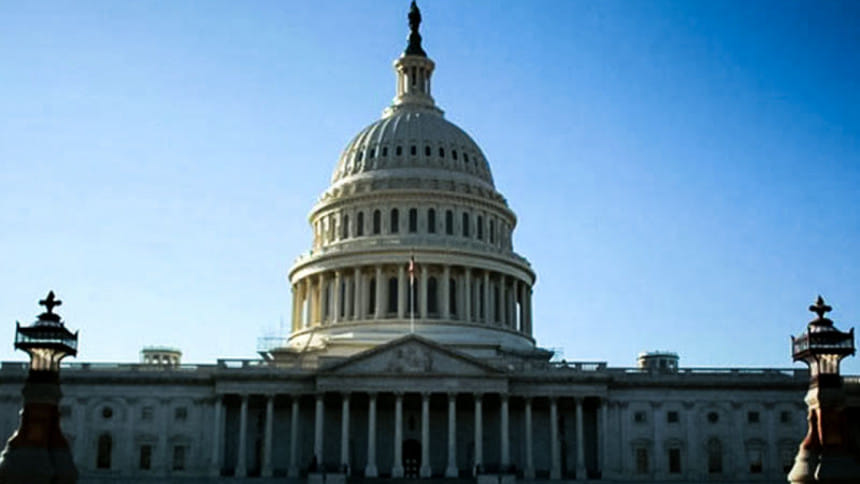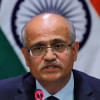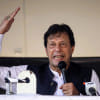US lawmakers urge Trump to mediate between India-Pakistan

Key US Senators and Congressmen are now urging President Donald Trump to play a constructive role in helping resolve Kashmir and other underlying disputes between India and Pakistan.
In a letter they sent to President Trump on Thursday afternoon, Senators Chris Van Hollen, Todd Young, Ben Cardin and Lindsay Graham also expressed concern over the human rights situation in Kashmir and urged him to use his influence to get released the people detained after August 5, when India annexed the occupied valley.
"We ask that you call upon Prime Minister (Narendra Modi) Modi to fully restore telecommunications and internet services, lift the lockdown and curfew, and release Kashmiris detained pursuant to India's revocation of Article 370," they wrote.
In another letter, Indian-American Congresswoman Pramila Jayapal another American lawmaker asked US Secretary of State Mike Pompeo to press India to immediately end the communications blockade in Kashmir and release those who have been detained.
"We write to express our concern regarding the situation in Kashmir, which has grave implications for democracy, human rights and regional stability," said the four senators in a letter they sent to President Trump.
"While we support your goal of working with the parties to help find a long-term resolution to the status of Kashmir, we write now to urge you to immediately facilitate an end to the current humanitarian crisis there."
The signatories, who include one of Trump's close adviser on South Asian affairs, Senator Graham and the Karachi-born Senator Van Hollen, reminded Trump of his July 22 offer to play a mediatory role in easing India-Pakistan tensions over Kashmir and other issues.
"In keeping with your offer of assistance in July, we believe that US engagement with India will be critical in providing relief for the all of the people of Kashmir," they wrote. "The United States has a vital role to play in facilitating a resolution to this humanitarian crisis, and we urge you to act swiftly."
Prime Minister Imran Khan also attended the July 22 White House briefing where Trump announced his intention to mediate and had immediately accepted the offer. India, however, rejected the suggestion, announcing that it would never accept external help for resolving its disputes with Pakistan.
The senators noted that on August 5, the Indian government "unilaterally revoked Article 370 of the Indian constitution, which afforded autonomy to the state of Jammu and Kashmir."
They also noted that shortly before revoking Article 370, India deployed tens of thousands of additional troops to the Kashmir Valley, imposed curfews on its residents, and severed communications to the region, including access to the internet and telephones.
"This information blackout has severely limited access to medical services, prevented families from contacting each other, and disrupted the local economy," the senators wrote.
Referring to press reports that at least 4,000 people have subsequently been detained in Kashmir and held under the Public Safety Act, the US lawmakers noted that this was "a controversial law that allows authorities to imprison someone for up to two years without charge or trial." Those detained included local politicians, activists, academics and students, they added.
"With each passing day, the situation for the people of Kashmir becomes increasingly difficult," the senators reminded Trump while urging him to use influence to bring relief to these people.
"Pakistan must also end its support and safe haven for militant groups operating on its soil – including those targeting India – and refrain from taking any steps that could further destabilise Kashmir," the senators added.
"Once the urgent humanitarian situation has been addressed, we hope the United States can play a constructive role in helping resolve the underlying disputes between the two nuclear powers, India and Pakistan," said the four senators while reminding Trump why he needed to play a more active role in resolving the Kashmir crisis.
Another US Senator Bob Casey said India's changes to the status of Jammu and Kashmir were a "drastic shift" from decades of precedent and policy which increases the potential for escalated conflict between India and Pakistan, and raises serious concerns about the safety and security of the people of Jammu and Kashmir.
"I am committed to promoting democracy, human rights and self-determination for the people of Jammu and Kashmir. Accordingly, both India and Pakistan should refrain from incendiary actions that undermine security and human rights in the region," Casey said.
"The Trump administration's failure to appoint a US Ambassador to Pakistan or an Assistant Secretary of State for South and Central Asian Affairs has left the United States unprepared and ill-equipped to engage meaningfully to ensure the rights and safety of the people of Jammu and Kashmir," Casey said.
In another statement, Congressman Eric Swalwell said the strife in Kashmir was not just about India and Pakistan, but about an issue that has worldwide military, economic and moral consequences.
"The United States must show patient diplomacy to de-escalate the rhetoric and ensure these two nuclear powers do not reach a point of no return," he said.
"This can be progressively achieved beginning with measures such as the immediate restoration of the ability for Kashmiris to communicate with their families and by working toward re-establishment of democratic governance," Swalwell said.
In their letter to Secretary Pompeo, Congresswoman Jayapal and Congressman James P McGovern said the international media and independent human rights observers must immediately be allowed into Jammu and Kashmir to investigate reports of abuse.
"We urge you to work across the Administration to press the Indian government to immediately end its communications blackout of Kashmir, expedite the process of reviewing and releasing individuals 'preventatively' detained, ensure hospitals have access to life-saving medicines and protect the rights of the Kashmiri people to freedom of assembly and worship," they wrote.
Copyright: Dawn/ Asia News Network (ANN)

 For all latest news, follow The Daily Star's Google News channel.
For all latest news, follow The Daily Star's Google News channel. 








Comments